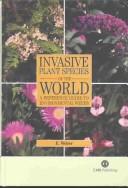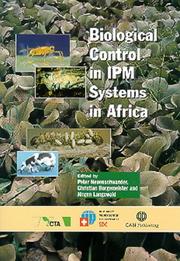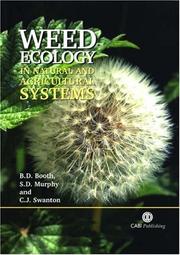| Listing 1 - 9 of 9 |
Sort by
|
Book
Year: 2003 Publisher: Washington, DC : U.S. Dept. of Justice, Office of Justice Programs, Executive Office for Weed and Seed,
Abstract | Keywords | Export | Availability | Bookmark
 Loading...
Loading...Choose an application
- Reference Manager
- EndNote
- RefWorks (Direct export to RefWorks)
Crime prevention --- Citizen participation --- Operation Weed and Seed (U.S.)

ISBN: 0851996957 Year: 2003 Publisher: Wallingford : CABI Publishing,
Abstract | Keywords | Export | Availability | Bookmark
 Loading...
Loading...Choose an application
- Reference Manager
- EndNote
- RefWorks (Direct export to RefWorks)
Plant ecology. Plant sociology --- Phytogeography --- Végétation --- vegetation --- Introduction de plantes --- Plant introduction --- Dynamique des populations --- population dynamics --- Compétition biologique --- Biological competition --- Écologie --- ecology --- world --- ECO Ecology --- invasive species --- weeds --- worldwide --- Invasive plants --- Weeds --- -632.51 --- 581.522.6 --- Pest plants --- Weed plants --- Weedy plants --- Plant pests (Plants) --- Agricultural pests --- Botany, Economic --- Plants --- Plant invaders --- Alien plants --- Plant invasions --- Control --- Migration. Dissemination --- -Control --- 581.522.6 Migration. Dissemination --- 632.51 Weeds --- 632.51 --- Crops --- Eradication of weeds --- Suppression, Weed --- Weed control --- Weed eradication --- Weed management --- Weed suppression --- Vegetation management --- Herbicides --- Eradication --- Management --- vegetation. --- Lutte
Book
ISBN: 2912199131 9782912199133 Year: 2003 Publisher: Paris: Ed. Agridécisions,
Abstract | Keywords | Export | Availability | Bookmark
 Loading...
Loading...Choose an application
- Reference Manager
- EndNote
- RefWorks (Direct export to RefWorks)
Mauvaise herbe --- Weeds --- Désherbage --- Weed control --- Lutte culturale --- Cultural control --- Lutte physique --- Physical control --- Agriculture biologique --- Organic agriculture
Book
ISBN: 9251050198 Year: 2003 Publisher: Rome : FAO,
Abstract | Keywords | Export | Availability | Bookmark
 Loading...
Loading...Choose an application
- Reference Manager
- EndNote
- RefWorks (Direct export to RefWorks)
Weed management does not consist solely in the use of herbicides: other methods exist. The paper emphasizes the importance of evaluating weed ecology in understanding weed problems, the need to evaluate seed banks in the soil, the importance of evaluating weed competition and the ability of crops to compete with weeds. Also covered are troublesome weed problems including water hyacinth, and the risks and benefits of using transgenic herbicide-resistant crops.
Mauvaise herbe --- Weeds --- Mauvaise herbe aquatique --- Aquatic weeds --- Succession écologique --- ecological succession --- Dynamique des populations --- population dynamics --- Désherbage --- Weed control --- Herbicides --- Résistance aux produits chimiques --- Resistance to chemicals --- Lutte intégrée --- Integrated control --- Pays en développement --- Developing countries --- 632.51 --- 632.51 Weeds --- Herbicide resistance --- Water hyacinth --- Weed risk assessment --- Risk assessment --- Pest plants --- Weed plants --- Weedy plants --- Plant pests (Plants) --- Agricultural pests --- Botany, Economic --- Plants --- Eichhornia crassipes --- Hyacinth, Water --- Waterhyacinth --- Eichhornia --- Resistance to herbicides --- Pesticide resistance --- Control --- Effect of herbicides on

ISBN: 0851996396 Year: 2003 Publisher: Wallingford : CABI,
Abstract | Keywords | Export | Availability | Bookmark
 Loading...
Loading...Choose an application
- Reference Manager
- EndNote
- RefWorks (Direct export to RefWorks)
Pests --- Animaux et plantes nuisibles, Lutte biologique contre les --- Biological control --- Désherbage --- Weed control --- Lutte anti-insecte --- Insect control --- Lutte intégrée --- Integrated control --- Lutte biologique --- Étude de cas --- case studies --- Afrique --- Africa
Book
Year: 2003 Publisher: Salmon, Idaho U.S. Forest Service
Abstract | Keywords | Export | Availability | Bookmark
 Loading...
Loading...Choose an application
- Reference Manager
- EndNote
- RefWorks (Direct export to RefWorks)
Control --- Environmental analysis --- Environmental aspects --- Environmental conditions --- Forest management --- Forests and forestry --- Noxious weeds --- Weed control --- Challis National Forest --- Challis National Forest (Idaho) --- Idaho --- Salmon National Forest --- Salmon National Forest (Idaho)

ISBN: 0802086306 0802089461 9786611992583 1442672684 1281992585 9781442672680 9780802086303 9780802089465 Year: 2003 Publisher: Toronto, Ont : University of Toronto Press,
Abstract | Keywords | Export | Availability | Bookmark
 Loading...
Loading...Choose an application
- Reference Manager
- EndNote
- RefWorks (Direct export to RefWorks)
Should the use of cannabis be decriminalized or legalized? If so, how should it be legislated, and for whom? Although Western nations have sought to address these questions for decades, there has never been a thorough and comprehensive study of the subject. A special committee of the Canadian senate sought to rectify this, and when their report was made public, it astonished observers with its audacious recommendations. Important scientific resources were used for the committee's purposes: the investigations of 23 international researchers based on 200 interviews; the work of Canadian specialists working in an array of disciplines; and a large number of discussion groups. The essential recommendations of the report are found in this book. The Senate committee proposes new perspectives on illicit drugs, calling for a rational new political view that does not marginalize users. With innovative scientific investigation and bold recommendations, this report, prefaced by Senator Nolin, is an indispensable tool in the national and international debate surrounding cannabis.
Narcotic laws --- Ganja --- Marihuana --- Marijuana --- Narcotics --- Drugs --- Pharmacy --- Cannabis --- Law and legislation --- Government policy --- Social aspects --- Drogues --- Droit --- Politique gouvernementale --- Aspect social --- Weed (Marijuana) --- Canada. --- Canada (Province) --- Canadae --- Ceanada --- Chanada --- Chanadey --- Dominio del Canadá --- Dominion of Canada --- Jianada --- Kʻaenada --- Kaineḍā --- Kanada --- Ḳanadah --- Kanadaja --- Kanadas --- Ḳanade --- Kanado --- Kanakā --- Province of Canada --- Republica de Canadá --- Yn Chanadey --- DROGUES --- CANNABIS --- OPINION --- MARIJUANA --- PREVENTION --- POLITIQUE CRIMINELLE --- CANADA
Book
ISBN: 2760618781 9791036501951 2760623920 9782760618787 9782760623927 2760629341 Year: 2003 Volume: 34,1 Publisher: Montréal: Presses de l'Université de Montréal,
Abstract | Keywords | Export | Availability | Bookmark
 Loading...
Loading...Choose an application
- Reference Manager
- EndNote
- RefWorks (Direct export to RefWorks)
Faut-il décriminaliser, voire légaliser l'usage du cannabis ? Si oui, dans quel cadre législatif et pour qui ? Ces questions qui agitent les pouvoirs publics occidentaux depuis des décennies n'avaient pas encore fait l'objet d'études approfondies et complètes. Un comité spécial du Sénat canadien s'y est attaqué. Le rapport qu'il a rendu public a étonné tous les observateurs par la rigueur de ses recherches et l'audace de ses propositions. D'importantes ressources scientifiques ont été mobilisées pour faire le point : 23 rapports de recherches réalisés par des scientifiques de réputation internationale, plus de 200 témoins, chercheurs et spécialistes au Canada et à l'étranger, de nombreux groupes de discussion… Le débat sur le cannabis sort enfin sur la place publique. L'essentiel du rapport et toutes les recommandations se retrouvent dans ce livre. Le Comité propose des perspectives nouvelles face aux drogues illicites, rappelant la nécessité de trouver une politique différente et efficace « qui ne banalise ni ne marginalise les usages ». Novateur dans ses bases scientifiques et courageux dans ses recommandations, ce rapport, précédé d'une préface du sénateur Nolin, devient désormais indispensable à toute discussion sur le cannabis au niveau national et international.
343.966 <71> --- 633.888 --- Drugs--Canada --- Plants yielding drugs affecting the nervous system. Valerian. Papaver somniferum (opium poppy). Cannabis sativa (Indian hemp, hashish). Belladonna (deadly nightshade). Nuxvomica (as source of strychnine). Others --- 633.888 Plants yielding drugs affecting the nervous system. Valerian. Papaver somniferum (opium poppy). Cannabis sativa (Indian hemp, hashish). Belladonna (deadly nightshade). Nuxvomica (as source of strychnine). Others --- 343.966 <71> Drugs--Canada --- Marijuana --- Narcotic laws --- Marijuana. --- Drogues --- Droit --- Politique gouvernementale --- Aspect social --- Law and legislation --- Government policy --- Social aspects --- Ganja --- Marihuana --- Cannabis --- Narcotics --- Drugs --- Pharmacy --- Weed (Marijuana) --- politique contre les drogues --- toxicomanie --- cannabis --- marijuana

ISBN: 0851995284 Year: 2003 Publisher: Wallingford : CABI Publishing,
Abstract | Keywords | Export | Availability | Bookmark
 Loading...
Loading...Choose an application
- Reference Manager
- EndNote
- RefWorks (Direct export to RefWorks)
Mauvaise herbe --- Weeds --- Plante nuisible --- noxious plants --- Plante sauvage --- Wild plants --- Plante de culture --- Crops --- Introduction de plantes --- Plant introduction --- Compétition biologique --- Biological competition --- Dynamique des populations --- population dynamics --- Succession écologique --- ecological succession --- Écologie --- ecology --- 632.51 --- 574.3 --- 581.524 --- -Pest plants --- Weed plants --- Weedy plants --- Plant pests (Plants) --- Agricultural pests --- Botany, Economic --- Plants --- Populations and environment. Population dynamics --- Associational ecology. Synecology --- Ecology --- ECO Ecology --- weeds --- -Weeds --- 581.524 Associational ecology. Synecology --- 574.3 Populations and environment. Population dynamics --- 632.51 Weeds --- -581.524 Associational ecology. Synecology --- Pest plants
| Listing 1 - 9 of 9 |
Sort by
|

 Search
Search Feedback
Feedback About UniCat
About UniCat  Help
Help News
News